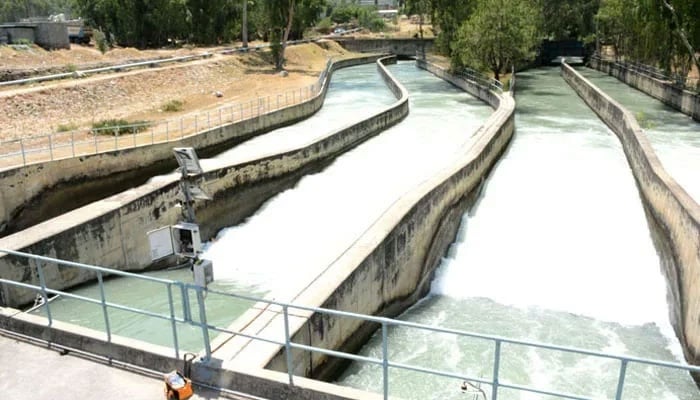Expert says severe irrigation water shortages to threaten yields
PESHAWAR: An agricultural expert and former secretary Pakistan Tobacco Board (PTB) Khan Faraz has stated that Pakistan has been experiencing an escalating water crisis, driven by rapid population growth, climate change and mismanagement of resources.
“The immense population growth has placed pressure on natural resources, food security, and the most alarming consequence of this growth has been the diminishing availability of clean water for agricultural, industrial, and domestic use,” he opined while talking to The News.
Khan Faraz said that Pakistan being an agricultural country, agriculture is the backbone of the country’s economy. Agriculture, he added, is the primary consumer of the country’s fresh water, accounting for approximately 97 per cent of the country’s total water usage.
“This sector contributes nearly 23 per cent to the national GDP and employs 42 per cent of the population. However, the growing water crisis is posing a severe threat to agricultural output,” the expert explained.Keeping recent data in mind, he said Pakistan is likely to face a 43 percent water shortfall in April 2025.
“The Indus River System Authority (IRSA) blamed below normal snowfall, declining river inflows and a dry summer forecast for the water shortfall. The shortage comes at a critical time, with wheat harvesting underway and preparation beginning for summer crops like cotton, rice and sugarcane,” he maintained.
With reservoir levels critically low, Khan Faraz said that farmers, particularly in Punjab and Sindh, the country’s agricultural heartlands, are bracing for severe irrigation water shortages that could threaten yields.
“It is worth mentioning that the country’s key water reservoirs have plunged to critical low levels (dead levels) in a development that poses a serious threat to the country’s agricultural output. According to Pakistan Meteorological Department (PMD), there will be a 43 percent shortfall in the water system.
-
 Prince William Questions Himself ‘what’s The Point’ After Saudi Trip
Prince William Questions Himself ‘what’s The Point’ After Saudi Trip -
 James Van Der Beek's Friends Helped Fund Ranch Purchase Before His Death At 48
James Van Der Beek's Friends Helped Fund Ranch Purchase Before His Death At 48 -
 King Charles ‘very Much’ Wants Andrew To Testify At US Congress
King Charles ‘very Much’ Wants Andrew To Testify At US Congress -
 Rosie O’Donnell Secretly Returned To US To Test Safety
Rosie O’Donnell Secretly Returned To US To Test Safety -
 Meghan Markle, Prince Harry Spotted On Date Night On Valentine’s Day
Meghan Markle, Prince Harry Spotted On Date Night On Valentine’s Day -
 King Charles Butler Spills Valentine’s Day Dinner Blunders
King Charles Butler Spills Valentine’s Day Dinner Blunders -
 Brooklyn Beckham Hits Back At Gordon Ramsay With Subtle Move Over Remark On His Personal Life
Brooklyn Beckham Hits Back At Gordon Ramsay With Subtle Move Over Remark On His Personal Life -
 Meghan Markle Showcases Princess Lilibet Face On Valentine’s Day
Meghan Markle Showcases Princess Lilibet Face On Valentine’s Day -
 Harry Styles Opens Up About Isolation After One Direction Split
Harry Styles Opens Up About Isolation After One Direction Split -
 Shamed Andrew Was ‘face To Face’ With Epstein Files, Mocked For Lying
Shamed Andrew Was ‘face To Face’ With Epstein Files, Mocked For Lying -
 Kanye West Projected To Explode Music Charts With 'Bully' After He Apologized Over Antisemitism
Kanye West Projected To Explode Music Charts With 'Bully' After He Apologized Over Antisemitism -
 Leighton Meester Reflects On How Valentine’s Day Feels Like Now
Leighton Meester Reflects On How Valentine’s Day Feels Like Now -
 Sarah Ferguson ‘won’t Let Go Without A Fight’ After Royal Exile
Sarah Ferguson ‘won’t Let Go Without A Fight’ After Royal Exile -
 Adam Sandler Makes Brutal Confession: 'I Do Not Love Comedy First'
Adam Sandler Makes Brutal Confession: 'I Do Not Love Comedy First' -
 'Harry Potter' Star Rupert Grint Shares Where He Stands Politically
'Harry Potter' Star Rupert Grint Shares Where He Stands Politically -
 Drama Outside Nancy Guthrie's Home Unfolds Described As 'circus'
Drama Outside Nancy Guthrie's Home Unfolds Described As 'circus'




